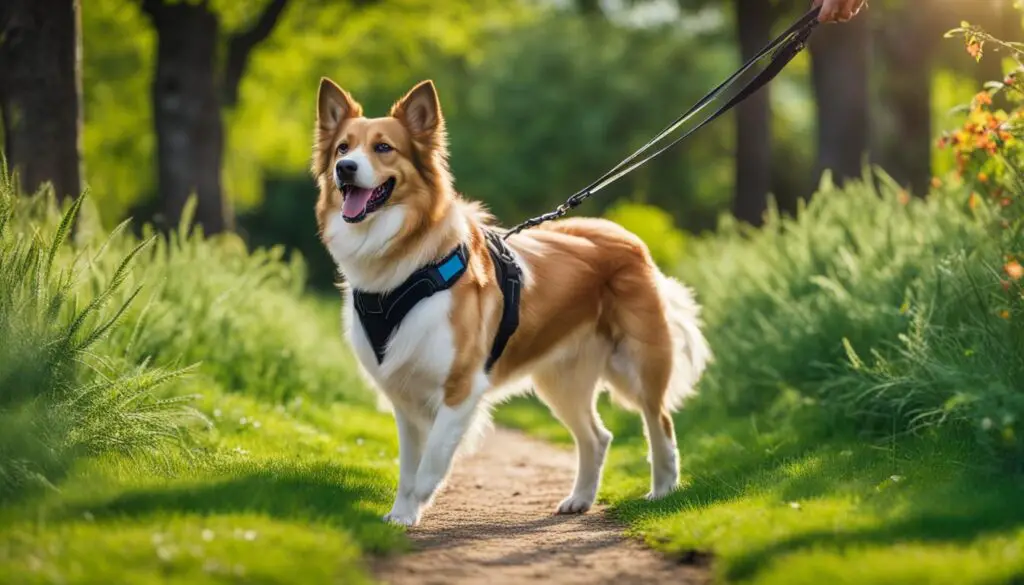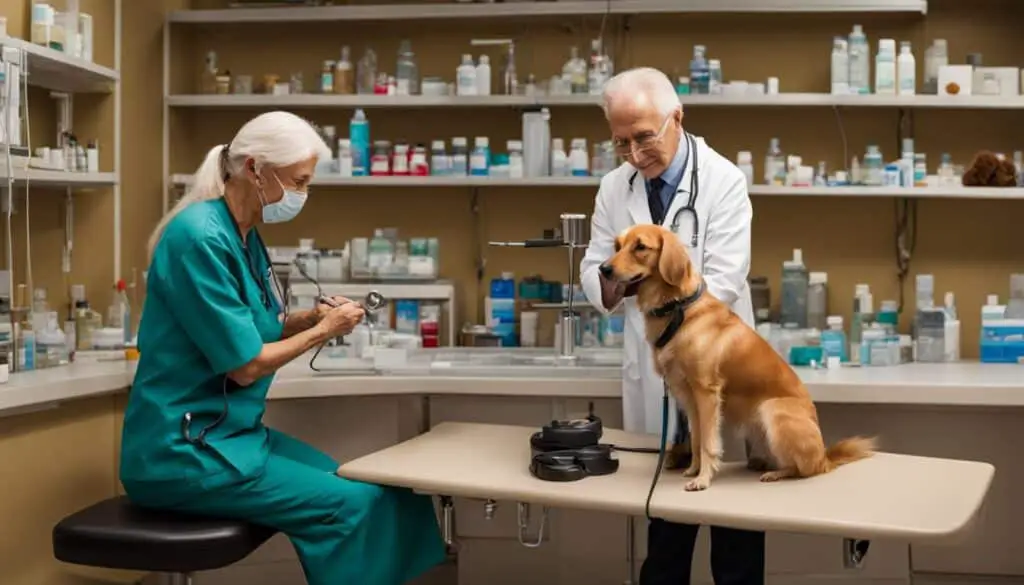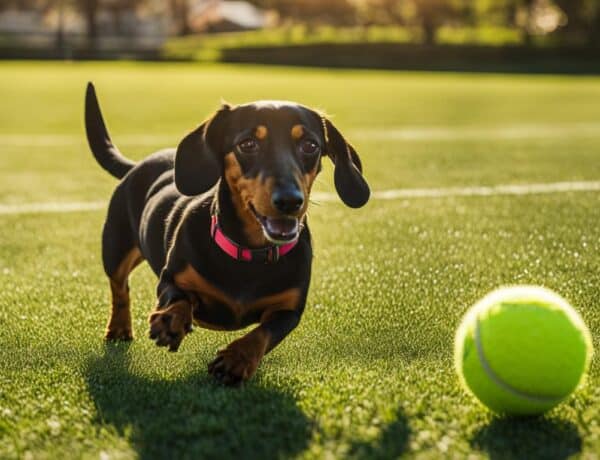As dogs age, they require special care to maintain their health and comfort. This is especially true for elderly small dogs, who may have unique needs and challenges. In this section, I will provide expert tips on how to care for your beloved senior canine companion. These tips will cover everything from nutrition and exercise to grooming and creating a comfortable environment.
Senior dog care encompasses a range of considerations, including their physical health, mental stimulation, and overall well-being. By implementing these expert tips, you can ensure that your elderly small dog lives their golden years in the best possible condition.
Key Takeaways:
- Elderly small dogs require special care and attention to maintain their health and comfort.
- Nutrition, exercise, and regular veterinary care are crucial for senior dog health.
- Creating a comfortable environment with orthopedic beds, support slings, and non-slip surfaces can improve their quality of life.
- Monitoring their activity level and making adjustments to their routine can help keep them active and prevent weight gain.
- Regular check-ups and blood work are essential for early detection and prompt treatment of any health issues.
Keeping Your Senior Dog Active
As our beloved furry friends age, it’s essential to prioritize their physical well-being and keep them active. Regular exercise not only helps maintain muscle mass and prevent weight gain, but it also promotes joint health and overall vitality. If you have a small breed senior dog, here are some expert tips to help keep them active and healthy.
Finding the Right Exercise Routine
When it comes to exercise for older dogs, it’s important to consider their individual needs and limitations. While they may not have the same stamina as when they were younger, finding activities that are low-impact yet engaging can help keep them active without causing undue strain. For small breed dogs, shorter but frequent walks are generally more suitable than long hikes. Remember to adjust the intensity and duration of exercise as needed, ensuring your furry companion remains comfortable and happy.
Monitoring Activity Levels
It’s crucial to pay attention to any changes in your senior dog’s activity levels. A gradual decrease in activity could be a sign of underlying pain or health issues. To keep track of their activity, consider using a dog monitor like the Whistle 3 dog GPS tracker and activity monitor. This innovative device allows you to monitor their daily exercise, ensuring they get the right amount of physical activity for their age and breed.
Regular playtime is also essential for mental stimulation and bonding with your senior dog. Engage in gentle games that cater to their limitations and preferences, such as puzzle toys or interactive treat-dispensing toys. These activities provide mental stimulation and help keep their minds sharp.
Importance of Social Interaction
While exercise is crucial, social interaction should not be overlooked. Small breed dogs often enjoy playdates with fellow doggy friends or gentle interactions with other animals. Regular socialization not only keeps your senior dog active but also promotes their overall well-being and happiness.
Remember, every dog is unique, and it’s important to consult with your veterinarian to determine the best exercise routine for your senior small breed dog. With proper care and attention, you can help keep your furry companion active, healthy, and happy in their golden years.
| Benefits of Exercise for Senior Dogs | Recommended Activities |
|---|---|
| 1. Maintains muscle mass | – Short walks |
| 2. Prevents weight gain | – Gentle playtime |
| 3. Promotes joint health | – Puzzle toys |
| 4. Increases vitality | – Interactive treat-dispensing toys |
Ensuring Regular Veterinary Care
Regular veterinary care is essential for senior dogs to ensure their overall health and well-being. As dogs age, they are more susceptible to various health conditions, which can be proactively managed and treated with timely check-ups. Annual or biannual visits to the veterinarian are recommended to monitor their health and catch any potential issues early on. These regular check-ups allow veterinarians to assess the dog’s overall condition, examine vital signs, and discuss any concerns or changes in behavior.
In addition to routine examinations, senior dogs also benefit from yearly blood work to monitor key indicators such as white and red blood cell counts, kidney and liver function, and hormonal balances. These tests help veterinarians detect any underlying health problems that may not be immediately apparent through physical examinations alone. Early detection of diseases such as kidney disease, diabetes, or thyroid issues is crucial for prompt treatment and management.
As part of regular veterinary care, senior dogs may also require vaccinations and parasite prevention measures to protect their immune system. Vaccinations help protect against diseases such as rabies, distemper, and parvovirus, while parasite prevention measures guard against fleas, ticks, heartworm, and intestinal parasites. Regular dental check-ups and cleanings are also important to maintain dental health and prevent issues such as periodontal disease, which can lead to discomfort and systemic infections.
By prioritizing regular veterinary care, pet owners can provide their senior dogs with the necessary preventive measures, early detection of health issues, and tailored treatments to ensure their well-being and longevity.
Benefits of Regular Veterinary Care for Senior Dogs:
- Early detection of health issues
- Timely treatment and management of diseases
- Monitoring vital indicators through blood work
- Preventive measures against parasites and diseases
- Dental care and prevention of dental issues
Expert Quotes:
Dr. Smith, a veterinarian specializing in senior dog care, emphasizes the importance of regular veterinary check-ups: “Senior dogs have unique health needs that require close monitoring and proactive care. Regular veterinary visits allow us to detect any health issues early on and provide appropriate treatments, ultimately helping them live a healthier and more comfortable life.”
Table: Recommended Veterinary Care Schedule for Senior Dogs
| Age | Recommended Veterinary Care |
|---|---|
| 7-9 years | Annual check-up, blood work, vaccinations, dental examination |
| 10-12 years | Biannual check-up, blood work, vaccinations, dental examination |
| 13+ years | Biannual check-up, blood work, vaccinations, dental examination, senior dog-specific screenings |
Creating a Comfortable Environment
When caring for older small dogs, it’s important to create a comfortable environment that caters to their specific needs. This can greatly enhance their well-being and quality of life. Here are some tips to help make their surroundings more comfortable:
Orthopedic or Heated Dog Beds
Dogs with arthritis or joint problems can benefit from orthopedic or heated dog beds. These specialized beds provide extra support and cushioning to alleviate discomfort and promote better sleep. The heating feature can also help soothe achy joints, especially during colder months.
Dog Support Slings or Harnesses
For senior dogs with mobility issues, dog support slings or harnesses can be incredibly helpful. These assistive devices provide extra support and stability, allowing your furry friend to move around more comfortably. They can make a significant difference in the dog’s ability to navigate their surroundings with ease.
Improving Traction on Floors
Slippery floors can be hazardous for older dogs, as they may struggle to maintain their balance. To improve traction, consider adding carpeting or using dog socks with non-slip soles. These simple additions can help prevent slips and falls, providing a safer environment for your furry companion.
Enhancing Feeding and Hydration
As dogs age, they may experience difficulties with feeding and hydration. Elevated dog bowls can minimize strain on their neck and joints, making mealtimes more comfortable. Additionally, placing additional water bowls throughout the house can ensure easy access to hydration at all times.
Ensuring Safe Navigation
Older dogs may have reduced vision or become disoriented in their surroundings. By installing nightlights and using dog gates strategically, you can help them navigate the house safely. Nightlights provide visibility during nighttime trips, while dog gates can restrict access to areas that may pose a risk to their well-being.
By implementing these small changes, you can create a comfortable environment that promotes the health and happiness of your geriatric furry friend. Remember, their comfort and well-being should always be a priority when caring for older small dogs.
FAQ
How can I keep my senior dog active?
Gradually decrease in activity level can be a sign of underlying pain or health issues. Adjusting their exercise routine to include more playtime or longer walks can help keep them active. Dog monitors like the Whistle 3 dog GPS tracker and activity monitor can help keep track of their activity level.
How often should I take my senior dog to the vet?
Annual or biannual check-ups are recommended for senior dogs. Regular veterinary care is essential to monitor their health and detect any diseases early. Yearly blood work is also recommended to monitor white and red blood cells and kidney and liver function.
What changes can I make to improve my senior dog’s comfort?
Making small changes to their environment can greatly improve their comfort. This includes providing orthopedic or heated dog beds for dogs with arthritis or joint problems. Dog support slings or harnesses can assist with mobility issues. Adding carpeting or using dog socks with non-slip soles can improve traction on slippery floors. Elevated dog bowls and additional water bowls can make feeding and hydration easier. Nightlights and dog gates can also help them navigate the home safely.







No Comments